Dissertation Proposal: Foreign Direct Investment and UK Economy
VerifiedAdded on 2023/06/14
|8
|2451
|72
Project
AI Summary
This dissertation proposal explores the impact of foreign direct investment (FDI) on the economic growth of the United Kingdom. The research aims to understand the relationship between FDI and economic growth, identify the benefits of FDI for the UK economy, and recommend optimal economic policies for encouraging or restricting FDI in specific sectors. The proposal outlines a quantitative research design utilizing secondary data from sources like UK government websites, the Office of National Statistics, and the OECD. The data, encompassing FDI and economic growth rates over the past 20 years, will be analyzed using SPSS and OLS regression to determine the correlation and impact of FDI on the UK's economic performance. The research is motivated by the need to address issues such as low capital flow and GDP, high unemployment, and the desire to inform policymakers on effective FDI strategies. The proposal includes a detailed timeline, resource assessment, and a list of relevant references, demonstrating a structured and viable approach to investigating the impact of foreign direct investment on the UK's economic development.
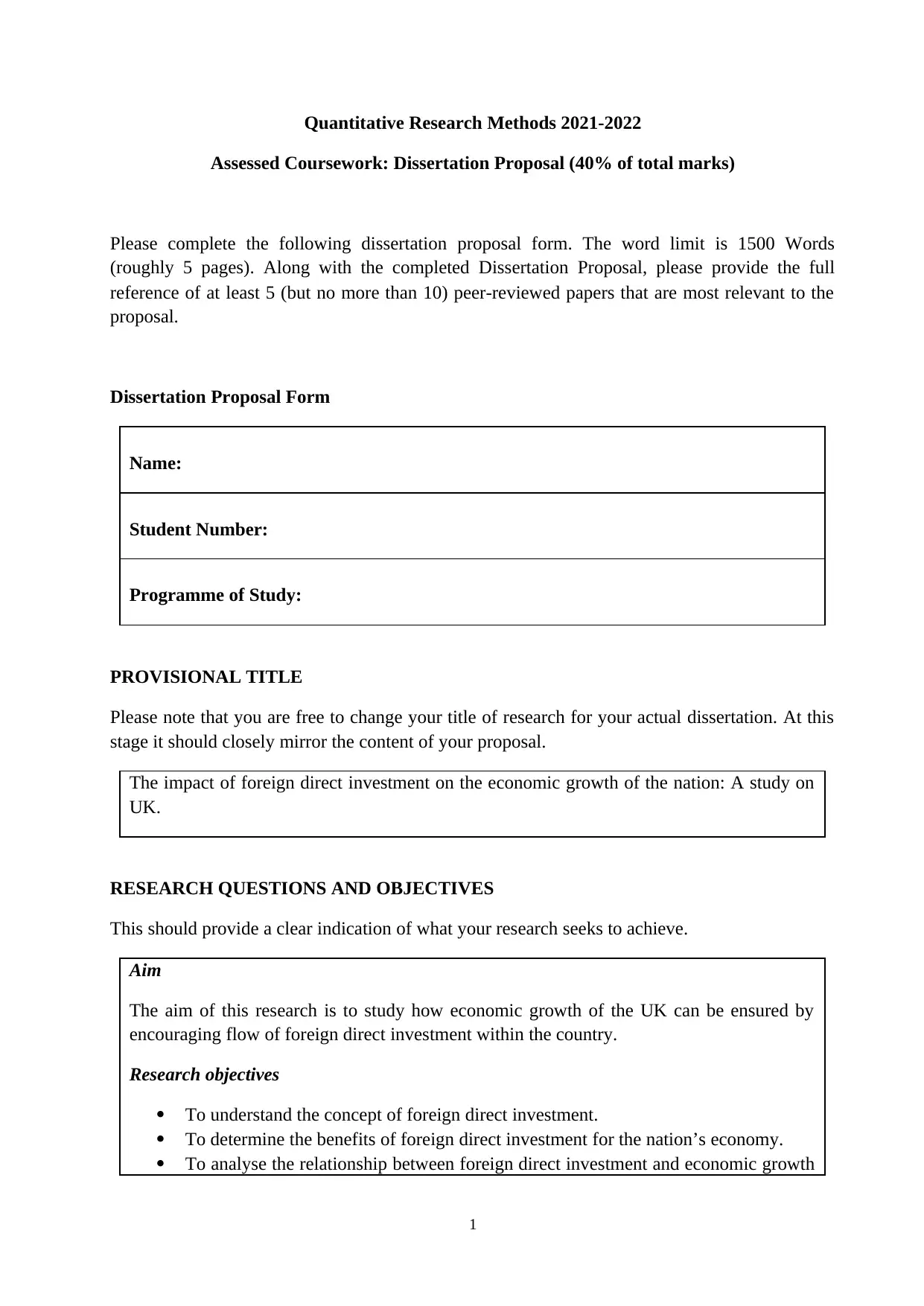
Quantitative Research Methods 2021-2022
Assessed Coursework: Dissertation Proposal (40% of total marks)
Please complete the following dissertation proposal form. The word limit is 1500 Words
(roughly 5 pages). Along with the completed Dissertation Proposal, please provide the full
reference of at least 5 (but no more than 10) peer-reviewed papers that are most relevant to the
proposal.
Dissertation Proposal Form
Name:
Student Number:
Programme of Study:
PROVISIONAL TITLE
Please note that you are free to change your title of research for your actual dissertation. At this
stage it should closely mirror the content of your proposal.
The impact of foreign direct investment on the economic growth of the nation: A study on
UK.
RESEARCH QUESTIONS AND OBJECTIVES
This should provide a clear indication of what your research seeks to achieve.
Aim
The aim of this research is to study how economic growth of the UK can be ensured by
encouraging flow of foreign direct investment within the country.
Research objectives
To understand the concept of foreign direct investment.
To determine the benefits of foreign direct investment for the nation’s economy.
To analyse the relationship between foreign direct investment and economic growth
1
Assessed Coursework: Dissertation Proposal (40% of total marks)
Please complete the following dissertation proposal form. The word limit is 1500 Words
(roughly 5 pages). Along with the completed Dissertation Proposal, please provide the full
reference of at least 5 (but no more than 10) peer-reviewed papers that are most relevant to the
proposal.
Dissertation Proposal Form
Name:
Student Number:
Programme of Study:
PROVISIONAL TITLE
Please note that you are free to change your title of research for your actual dissertation. At this
stage it should closely mirror the content of your proposal.
The impact of foreign direct investment on the economic growth of the nation: A study on
UK.
RESEARCH QUESTIONS AND OBJECTIVES
This should provide a clear indication of what your research seeks to achieve.
Aim
The aim of this research is to study how economic growth of the UK can be ensured by
encouraging flow of foreign direct investment within the country.
Research objectives
To understand the concept of foreign direct investment.
To determine the benefits of foreign direct investment for the nation’s economy.
To analyse the relationship between foreign direct investment and economic growth
1
Paraphrase This Document
Need a fresh take? Get an instant paraphrase of this document with our AI Paraphraser
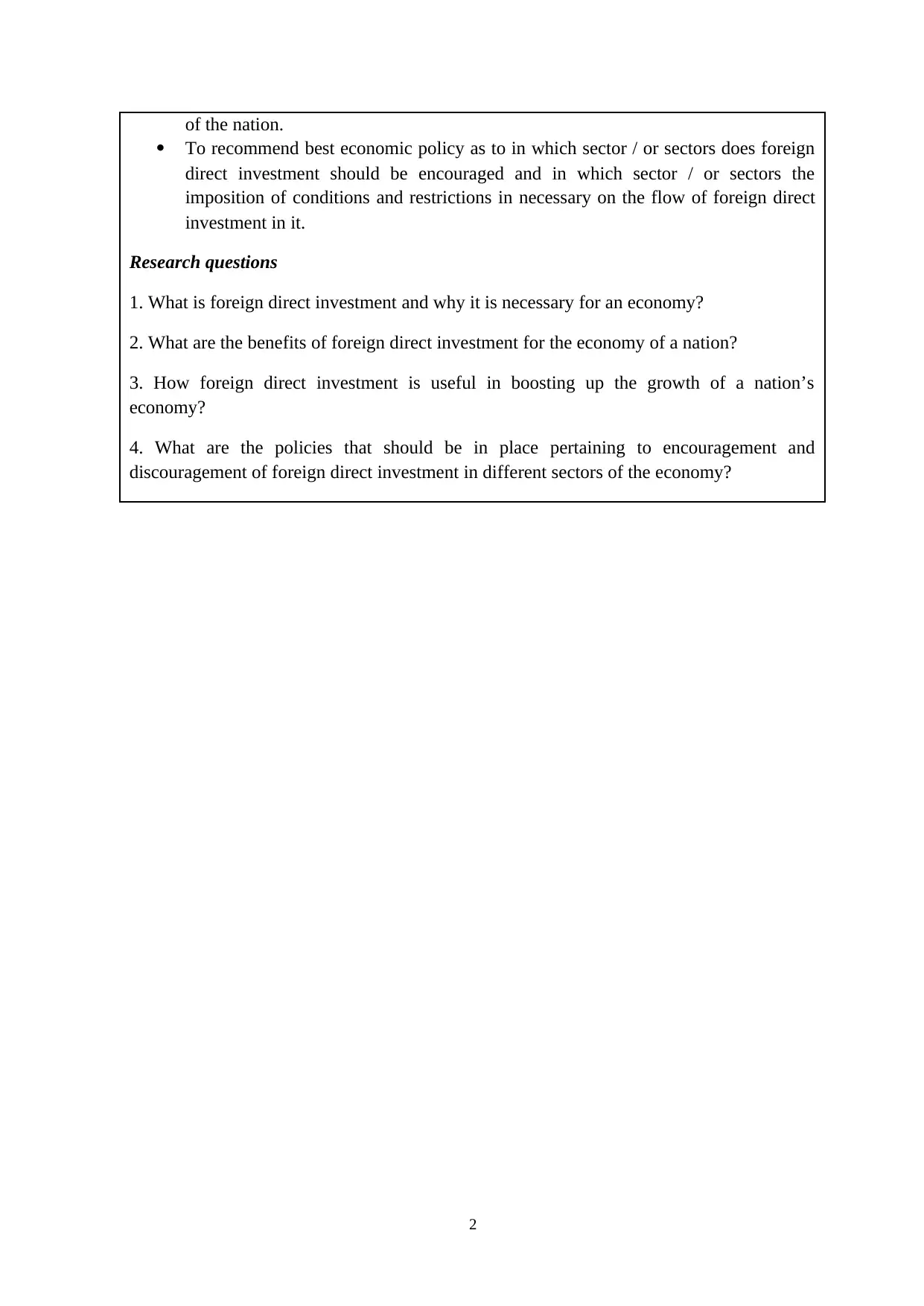
of the nation.
To recommend best economic policy as to in which sector / or sectors does foreign
direct investment should be encouraged and in which sector / or sectors the
imposition of conditions and restrictions in necessary on the flow of foreign direct
investment in it.
Research questions
1. What is foreign direct investment and why it is necessary for an economy?
2. What are the benefits of foreign direct investment for the economy of a nation?
3. How foreign direct investment is useful in boosting up the growth of a nation’s
economy?
4. What are the policies that should be in place pertaining to encouragement and
discouragement of foreign direct investment in different sectors of the economy?
2
To recommend best economic policy as to in which sector / or sectors does foreign
direct investment should be encouraged and in which sector / or sectors the
imposition of conditions and restrictions in necessary on the flow of foreign direct
investment in it.
Research questions
1. What is foreign direct investment and why it is necessary for an economy?
2. What are the benefits of foreign direct investment for the economy of a nation?
3. How foreign direct investment is useful in boosting up the growth of a nation’s
economy?
4. What are the policies that should be in place pertaining to encouragement and
discouragement of foreign direct investment in different sectors of the economy?
2
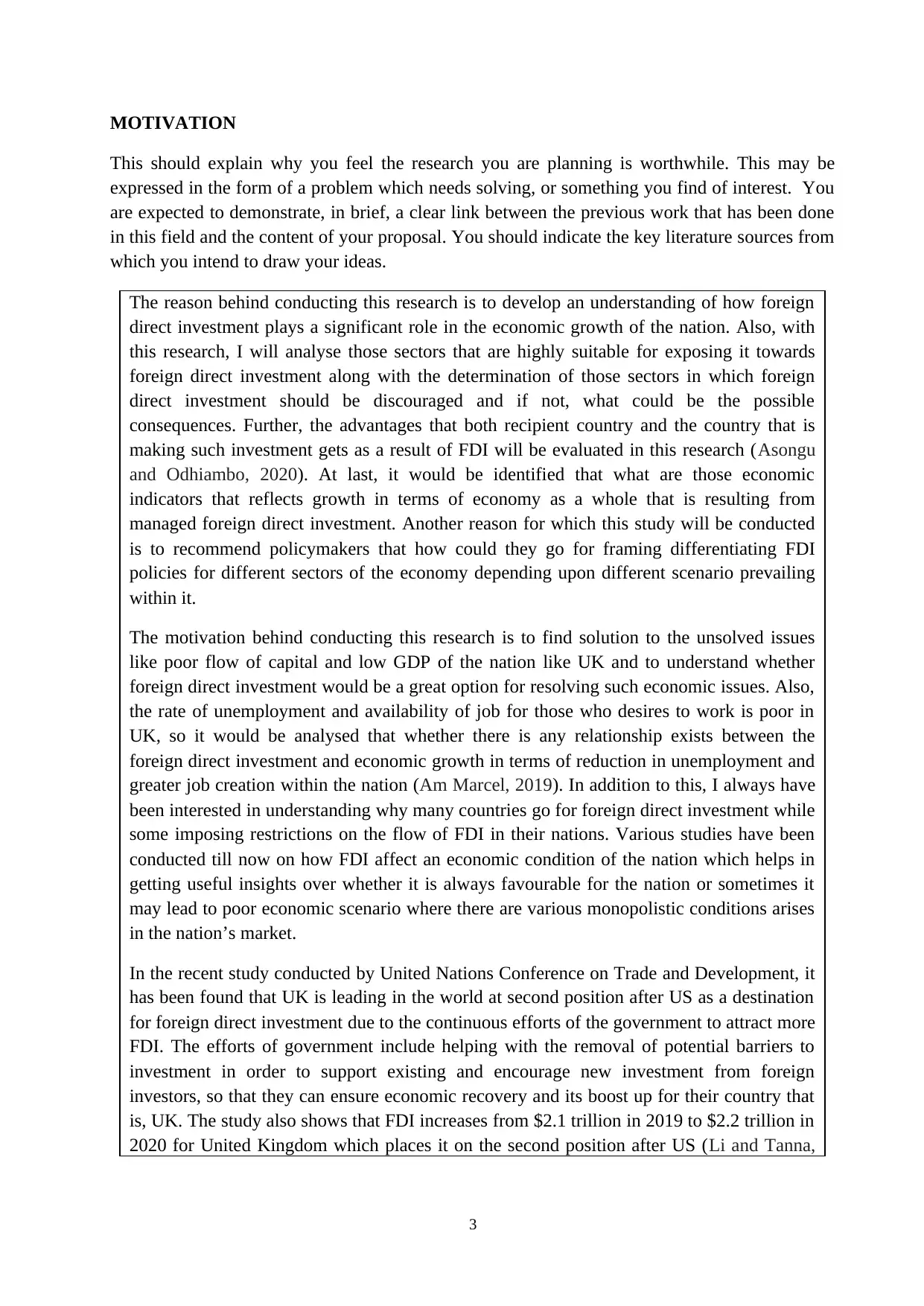
MOTIVATION
This should explain why you feel the research you are planning is worthwhile. This may be
expressed in the form of a problem which needs solving, or something you find of interest. You
are expected to demonstrate, in brief, a clear link between the previous work that has been done
in this field and the content of your proposal. You should indicate the key literature sources from
which you intend to draw your ideas.
The reason behind conducting this research is to develop an understanding of how foreign
direct investment plays a significant role in the economic growth of the nation. Also, with
this research, I will analyse those sectors that are highly suitable for exposing it towards
foreign direct investment along with the determination of those sectors in which foreign
direct investment should be discouraged and if not, what could be the possible
consequences. Further, the advantages that both recipient country and the country that is
making such investment gets as a result of FDI will be evaluated in this research (Asongu
and Odhiambo, 2020). At last, it would be identified that what are those economic
indicators that reflects growth in terms of economy as a whole that is resulting from
managed foreign direct investment. Another reason for which this study will be conducted
is to recommend policymakers that how could they go for framing differentiating FDI
policies for different sectors of the economy depending upon different scenario prevailing
within it.
The motivation behind conducting this research is to find solution to the unsolved issues
like poor flow of capital and low GDP of the nation like UK and to understand whether
foreign direct investment would be a great option for resolving such economic issues. Also,
the rate of unemployment and availability of job for those who desires to work is poor in
UK, so it would be analysed that whether there is any relationship exists between the
foreign direct investment and economic growth in terms of reduction in unemployment and
greater job creation within the nation (Am Marcel, 2019). In addition to this, I always have
been interested in understanding why many countries go for foreign direct investment while
some imposing restrictions on the flow of FDI in their nations. Various studies have been
conducted till now on how FDI affect an economic condition of the nation which helps in
getting useful insights over whether it is always favourable for the nation or sometimes it
may lead to poor economic scenario where there are various monopolistic conditions arises
in the nation’s market.
In the recent study conducted by United Nations Conference on Trade and Development, it
has been found that UK is leading in the world at second position after US as a destination
for foreign direct investment due to the continuous efforts of the government to attract more
FDI. The efforts of government include helping with the removal of potential barriers to
investment in order to support existing and encourage new investment from foreign
investors, so that they can ensure economic recovery and its boost up for their country that
is, UK. The study also shows that FDI increases from $2.1 trillion in 2019 to $2.2 trillion in
2020 for United Kingdom which places it on the second position after US (Li and Tanna,
3
This should explain why you feel the research you are planning is worthwhile. This may be
expressed in the form of a problem which needs solving, or something you find of interest. You
are expected to demonstrate, in brief, a clear link between the previous work that has been done
in this field and the content of your proposal. You should indicate the key literature sources from
which you intend to draw your ideas.
The reason behind conducting this research is to develop an understanding of how foreign
direct investment plays a significant role in the economic growth of the nation. Also, with
this research, I will analyse those sectors that are highly suitable for exposing it towards
foreign direct investment along with the determination of those sectors in which foreign
direct investment should be discouraged and if not, what could be the possible
consequences. Further, the advantages that both recipient country and the country that is
making such investment gets as a result of FDI will be evaluated in this research (Asongu
and Odhiambo, 2020). At last, it would be identified that what are those economic
indicators that reflects growth in terms of economy as a whole that is resulting from
managed foreign direct investment. Another reason for which this study will be conducted
is to recommend policymakers that how could they go for framing differentiating FDI
policies for different sectors of the economy depending upon different scenario prevailing
within it.
The motivation behind conducting this research is to find solution to the unsolved issues
like poor flow of capital and low GDP of the nation like UK and to understand whether
foreign direct investment would be a great option for resolving such economic issues. Also,
the rate of unemployment and availability of job for those who desires to work is poor in
UK, so it would be analysed that whether there is any relationship exists between the
foreign direct investment and economic growth in terms of reduction in unemployment and
greater job creation within the nation (Am Marcel, 2019). In addition to this, I always have
been interested in understanding why many countries go for foreign direct investment while
some imposing restrictions on the flow of FDI in their nations. Various studies have been
conducted till now on how FDI affect an economic condition of the nation which helps in
getting useful insights over whether it is always favourable for the nation or sometimes it
may lead to poor economic scenario where there are various monopolistic conditions arises
in the nation’s market.
In the recent study conducted by United Nations Conference on Trade and Development, it
has been found that UK is leading in the world at second position after US as a destination
for foreign direct investment due to the continuous efforts of the government to attract more
FDI. The efforts of government include helping with the removal of potential barriers to
investment in order to support existing and encourage new investment from foreign
investors, so that they can ensure economic recovery and its boost up for their country that
is, UK. The study also shows that FDI increases from $2.1 trillion in 2019 to $2.2 trillion in
2020 for United Kingdom which places it on the second position after US (Li and Tanna,
3
⊘ This is a preview!⊘
Do you want full access?
Subscribe today to unlock all pages.

Trusted by 1+ million students worldwide
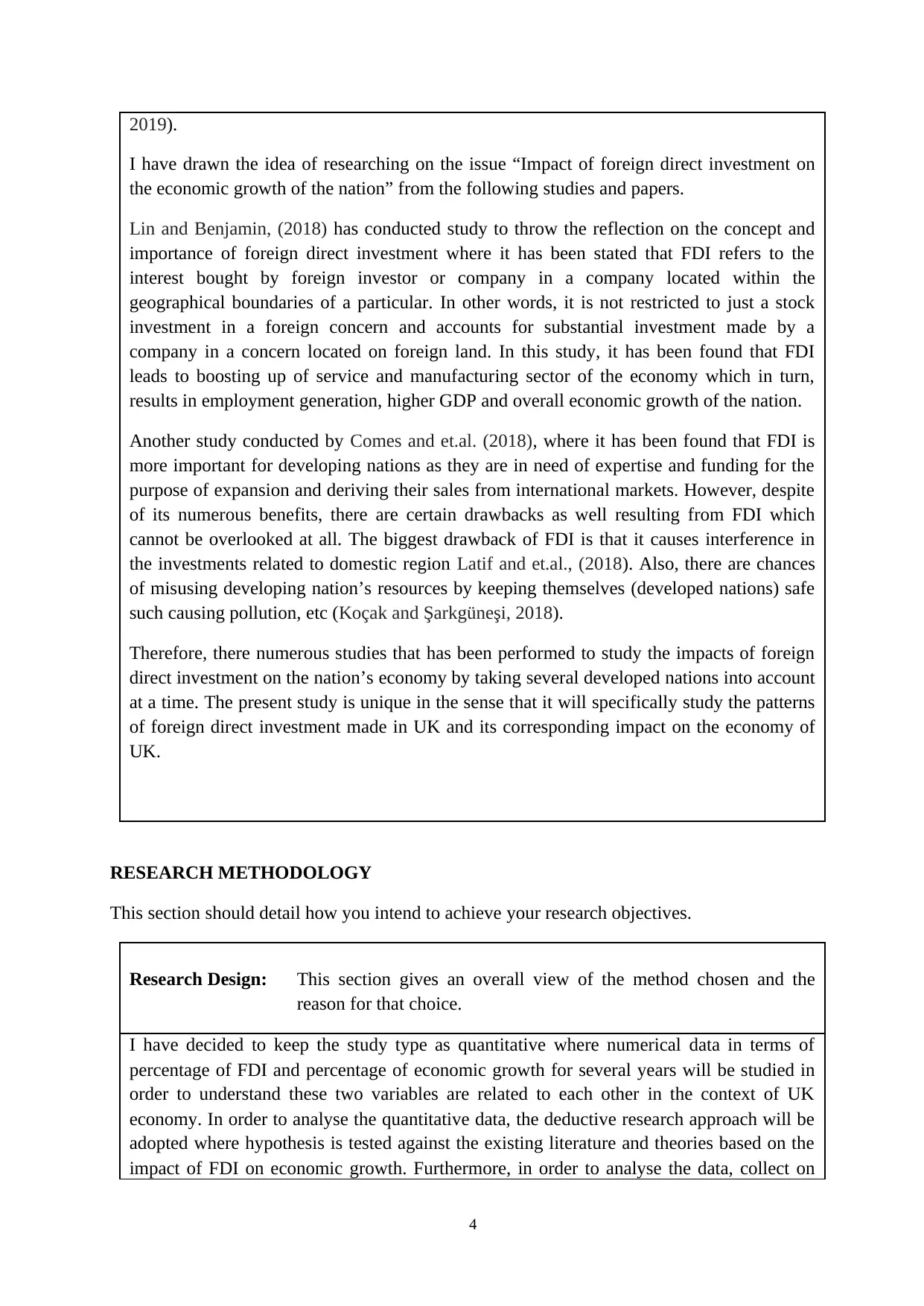
2019).
I have drawn the idea of researching on the issue “Impact of foreign direct investment on
the economic growth of the nation” from the following studies and papers.
Lin and Benjamin, (2018) has conducted study to throw the reflection on the concept and
importance of foreign direct investment where it has been stated that FDI refers to the
interest bought by foreign investor or company in a company located within the
geographical boundaries of a particular. In other words, it is not restricted to just a stock
investment in a foreign concern and accounts for substantial investment made by a
company in a concern located on foreign land. In this study, it has been found that FDI
leads to boosting up of service and manufacturing sector of the economy which in turn,
results in employment generation, higher GDP and overall economic growth of the nation.
Another study conducted by Comes and et.al. (2018), where it has been found that FDI is
more important for developing nations as they are in need of expertise and funding for the
purpose of expansion and deriving their sales from international markets. However, despite
of its numerous benefits, there are certain drawbacks as well resulting from FDI which
cannot be overlooked at all. The biggest drawback of FDI is that it causes interference in
the investments related to domestic region Latif and et.al., (2018). Also, there are chances
of misusing developing nation’s resources by keeping themselves (developed nations) safe
such causing pollution, etc (Koçak and Şarkgüneşi, 2018).
Therefore, there numerous studies that has been performed to study the impacts of foreign
direct investment on the nation’s economy by taking several developed nations into account
at a time. The present study is unique in the sense that it will specifically study the patterns
of foreign direct investment made in UK and its corresponding impact on the economy of
UK.
RESEARCH METHODOLOGY
This section should detail how you intend to achieve your research objectives.
Research Design: This section gives an overall view of the method chosen and the
reason for that choice.
I have decided to keep the study type as quantitative where numerical data in terms of
percentage of FDI and percentage of economic growth for several years will be studied in
order to understand these two variables are related to each other in the context of UK
economy. In order to analyse the quantitative data, the deductive research approach will be
adopted where hypothesis is tested against the existing literature and theories based on the
impact of FDI on economic growth. Furthermore, in order to analyse the data, collect on
4
I have drawn the idea of researching on the issue “Impact of foreign direct investment on
the economic growth of the nation” from the following studies and papers.
Lin and Benjamin, (2018) has conducted study to throw the reflection on the concept and
importance of foreign direct investment where it has been stated that FDI refers to the
interest bought by foreign investor or company in a company located within the
geographical boundaries of a particular. In other words, it is not restricted to just a stock
investment in a foreign concern and accounts for substantial investment made by a
company in a concern located on foreign land. In this study, it has been found that FDI
leads to boosting up of service and manufacturing sector of the economy which in turn,
results in employment generation, higher GDP and overall economic growth of the nation.
Another study conducted by Comes and et.al. (2018), where it has been found that FDI is
more important for developing nations as they are in need of expertise and funding for the
purpose of expansion and deriving their sales from international markets. However, despite
of its numerous benefits, there are certain drawbacks as well resulting from FDI which
cannot be overlooked at all. The biggest drawback of FDI is that it causes interference in
the investments related to domestic region Latif and et.al., (2018). Also, there are chances
of misusing developing nation’s resources by keeping themselves (developed nations) safe
such causing pollution, etc (Koçak and Şarkgüneşi, 2018).
Therefore, there numerous studies that has been performed to study the impacts of foreign
direct investment on the nation’s economy by taking several developed nations into account
at a time. The present study is unique in the sense that it will specifically study the patterns
of foreign direct investment made in UK and its corresponding impact on the economy of
UK.
RESEARCH METHODOLOGY
This section should detail how you intend to achieve your research objectives.
Research Design: This section gives an overall view of the method chosen and the
reason for that choice.
I have decided to keep the study type as quantitative where numerical data in terms of
percentage of FDI and percentage of economic growth for several years will be studied in
order to understand these two variables are related to each other in the context of UK
economy. In order to analyse the quantitative data, the deductive research approach will be
adopted where hypothesis is tested against the existing literature and theories based on the
impact of FDI on economic growth. Furthermore, in order to analyse the data, collect on
4
Paraphrase This Document
Need a fresh take? Get an instant paraphrase of this document with our AI Paraphraser
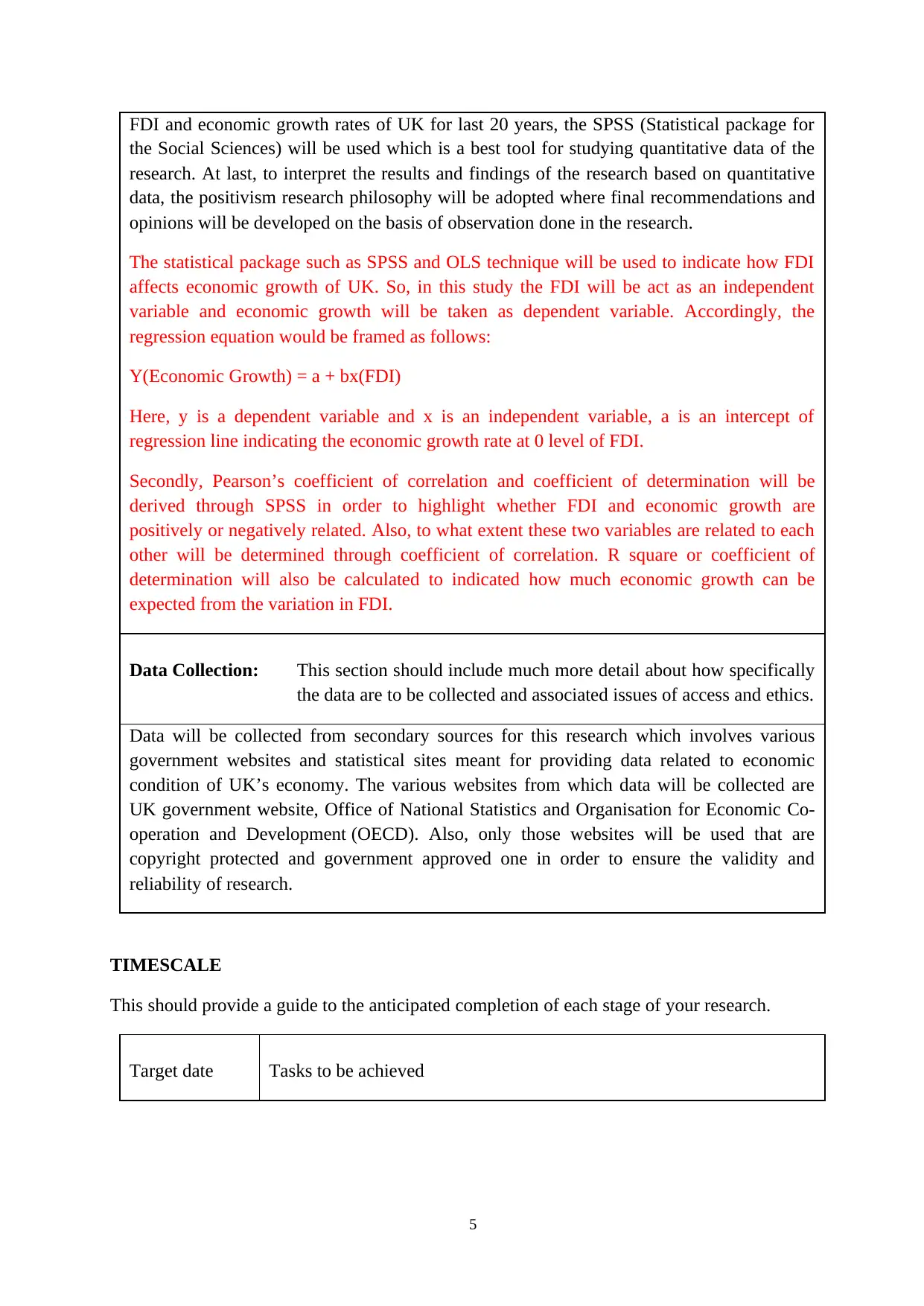
FDI and economic growth rates of UK for last 20 years, the SPSS (Statistical package for
the Social Sciences) will be used which is a best tool for studying quantitative data of the
research. At last, to interpret the results and findings of the research based on quantitative
data, the positivism research philosophy will be adopted where final recommendations and
opinions will be developed on the basis of observation done in the research.
The statistical package such as SPSS and OLS technique will be used to indicate how FDI
affects economic growth of UK. So, in this study the FDI will be act as an independent
variable and economic growth will be taken as dependent variable. Accordingly, the
regression equation would be framed as follows:
Y(Economic Growth) = a + bx(FDI)
Here, y is a dependent variable and x is an independent variable, a is an intercept of
regression line indicating the economic growth rate at 0 level of FDI.
Secondly, Pearson’s coefficient of correlation and coefficient of determination will be
derived through SPSS in order to highlight whether FDI and economic growth are
positively or negatively related. Also, to what extent these two variables are related to each
other will be determined through coefficient of correlation. R square or coefficient of
determination will also be calculated to indicated how much economic growth can be
expected from the variation in FDI.
Data Collection: This section should include much more detail about how specifically
the data are to be collected and associated issues of access and ethics.
Data will be collected from secondary sources for this research which involves various
government websites and statistical sites meant for providing data related to economic
condition of UK’s economy. The various websites from which data will be collected are
UK government website, Office of National Statistics and Organisation for Economic Co-
operation and Development (OECD). Also, only those websites will be used that are
copyright protected and government approved one in order to ensure the validity and
reliability of research.
TIMESCALE
This should provide a guide to the anticipated completion of each stage of your research.
Target date Tasks to be achieved
5
the Social Sciences) will be used which is a best tool for studying quantitative data of the
research. At last, to interpret the results and findings of the research based on quantitative
data, the positivism research philosophy will be adopted where final recommendations and
opinions will be developed on the basis of observation done in the research.
The statistical package such as SPSS and OLS technique will be used to indicate how FDI
affects economic growth of UK. So, in this study the FDI will be act as an independent
variable and economic growth will be taken as dependent variable. Accordingly, the
regression equation would be framed as follows:
Y(Economic Growth) = a + bx(FDI)
Here, y is a dependent variable and x is an independent variable, a is an intercept of
regression line indicating the economic growth rate at 0 level of FDI.
Secondly, Pearson’s coefficient of correlation and coefficient of determination will be
derived through SPSS in order to highlight whether FDI and economic growth are
positively or negatively related. Also, to what extent these two variables are related to each
other will be determined through coefficient of correlation. R square or coefficient of
determination will also be calculated to indicated how much economic growth can be
expected from the variation in FDI.
Data Collection: This section should include much more detail about how specifically
the data are to be collected and associated issues of access and ethics.
Data will be collected from secondary sources for this research which involves various
government websites and statistical sites meant for providing data related to economic
condition of UK’s economy. The various websites from which data will be collected are
UK government website, Office of National Statistics and Organisation for Economic Co-
operation and Development (OECD). Also, only those websites will be used that are
copyright protected and government approved one in order to ensure the validity and
reliability of research.
TIMESCALE
This should provide a guide to the anticipated completion of each stage of your research.
Target date Tasks to be achieved
5
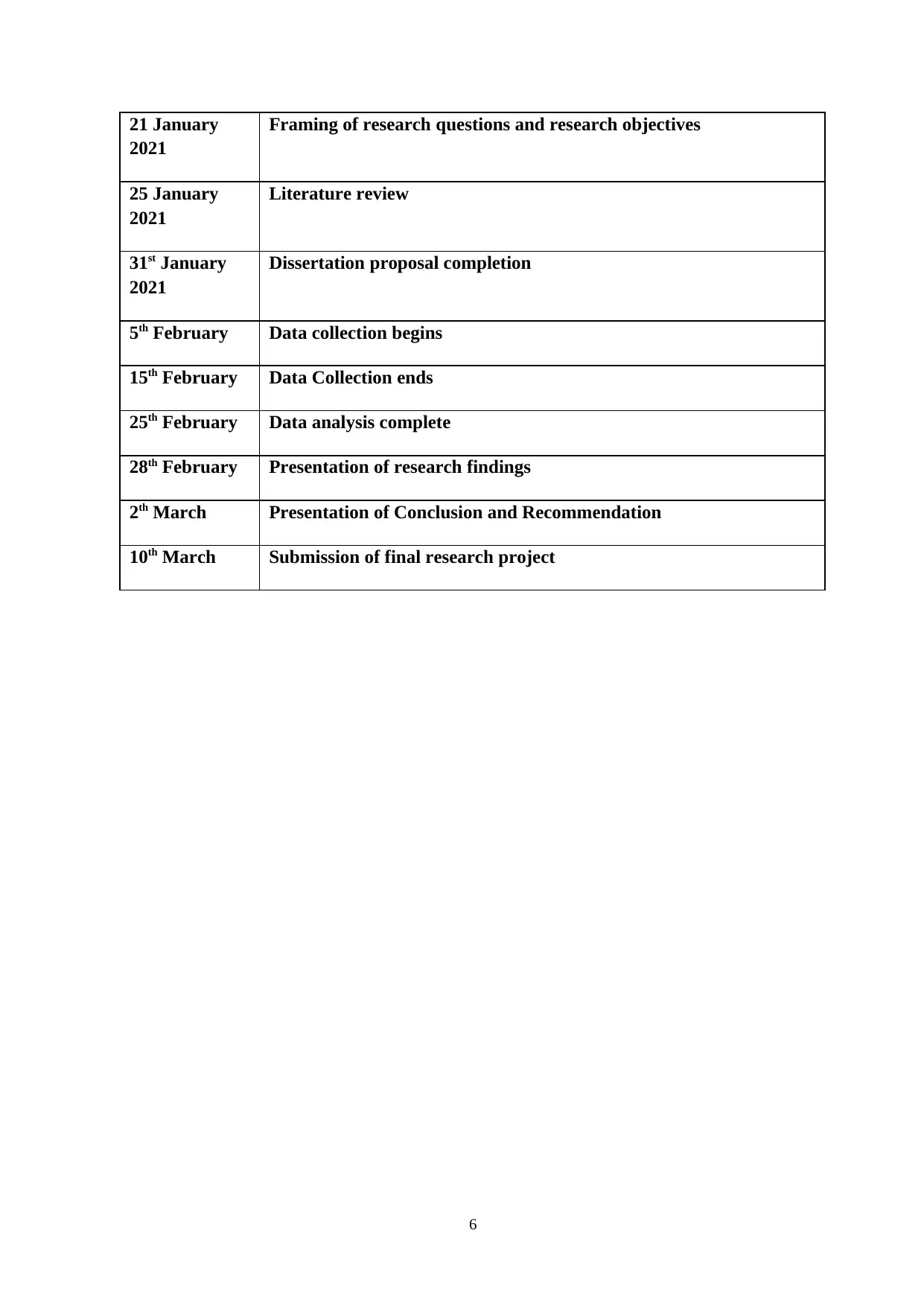
21 January
2021
Framing of research questions and research objectives
25 January
2021
Literature review
31st January
2021
Dissertation proposal completion
5th February Data collection begins
15th February Data Collection ends
25th February Data analysis complete
28th February Presentation of research findings
2th March Presentation of Conclusion and Recommendation
10th March Submission of final research project
6
2021
Framing of research questions and research objectives
25 January
2021
Literature review
31st January
2021
Dissertation proposal completion
5th February Data collection begins
15th February Data Collection ends
25th February Data analysis complete
28th February Presentation of research findings
2th March Presentation of Conclusion and Recommendation
10th March Submission of final research project
6
⊘ This is a preview!⊘
Do you want full access?
Subscribe today to unlock all pages.

Trusted by 1+ million students worldwide
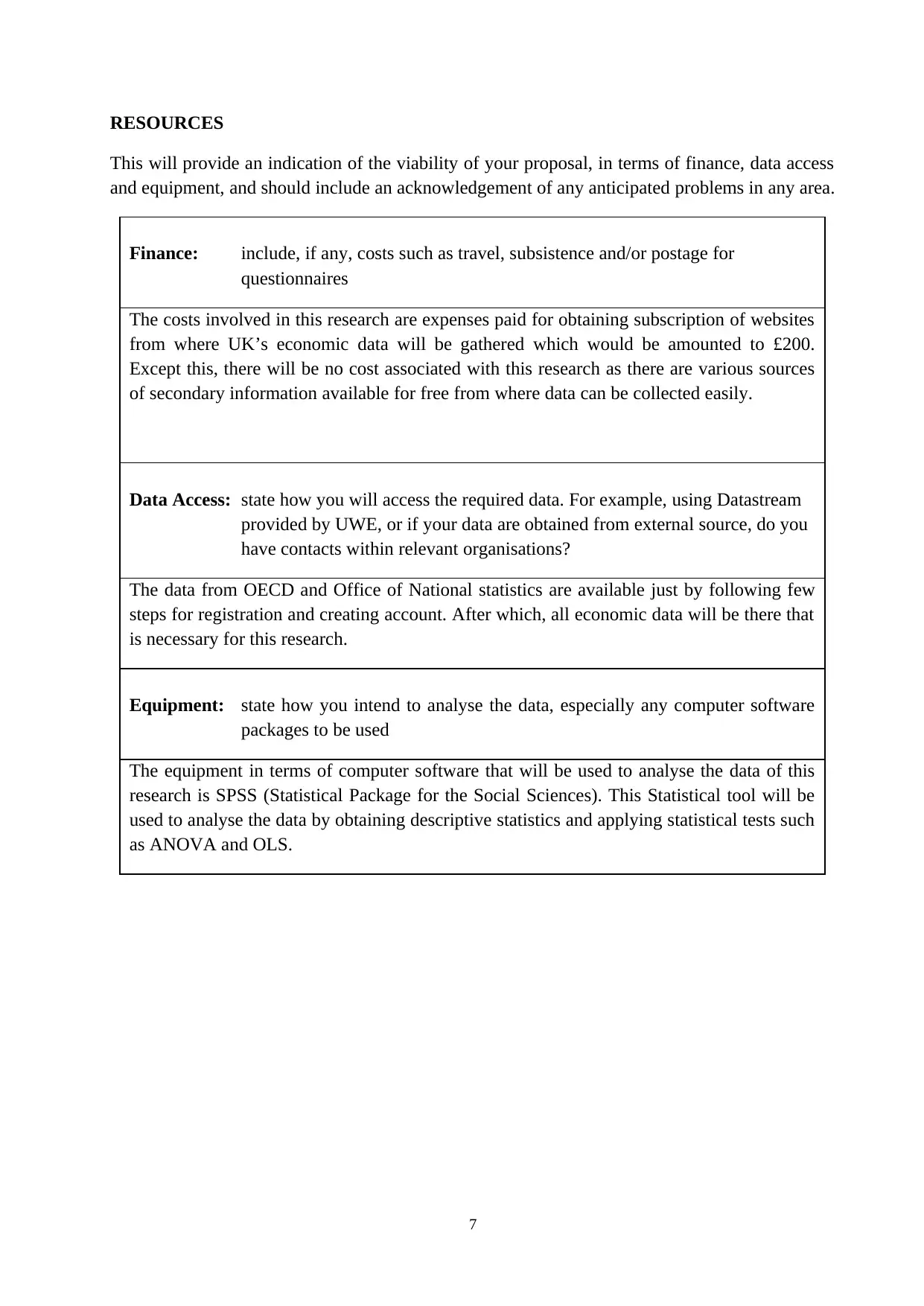
RESOURCES
This will provide an indication of the viability of your proposal, in terms of finance, data access
and equipment, and should include an acknowledgement of any anticipated problems in any area.
Finance: include, if any, costs such as travel, subsistence and/or postage for
questionnaires
The costs involved in this research are expenses paid for obtaining subscription of websites
from where UK’s economic data will be gathered which would be amounted to £200.
Except this, there will be no cost associated with this research as there are various sources
of secondary information available for free from where data can be collected easily.
Data Access: state how you will access the required data. For example, using Datastream
provided by UWE, or if your data are obtained from external source, do you
have contacts within relevant organisations?
The data from OECD and Office of National statistics are available just by following few
steps for registration and creating account. After which, all economic data will be there that
is necessary for this research.
Equipment: state how you intend to analyse the data, especially any computer software
packages to be used
The equipment in terms of computer software that will be used to analyse the data of this
research is SPSS (Statistical Package for the Social Sciences). This Statistical tool will be
used to analyse the data by obtaining descriptive statistics and applying statistical tests such
as ANOVA and OLS.
7
This will provide an indication of the viability of your proposal, in terms of finance, data access
and equipment, and should include an acknowledgement of any anticipated problems in any area.
Finance: include, if any, costs such as travel, subsistence and/or postage for
questionnaires
The costs involved in this research are expenses paid for obtaining subscription of websites
from where UK’s economic data will be gathered which would be amounted to £200.
Except this, there will be no cost associated with this research as there are various sources
of secondary information available for free from where data can be collected easily.
Data Access: state how you will access the required data. For example, using Datastream
provided by UWE, or if your data are obtained from external source, do you
have contacts within relevant organisations?
The data from OECD and Office of National statistics are available just by following few
steps for registration and creating account. After which, all economic data will be there that
is necessary for this research.
Equipment: state how you intend to analyse the data, especially any computer software
packages to be used
The equipment in terms of computer software that will be used to analyse the data of this
research is SPSS (Statistical Package for the Social Sciences). This Statistical tool will be
used to analyse the data by obtaining descriptive statistics and applying statistical tests such
as ANOVA and OLS.
7
Paraphrase This Document
Need a fresh take? Get an instant paraphrase of this document with our AI Paraphraser
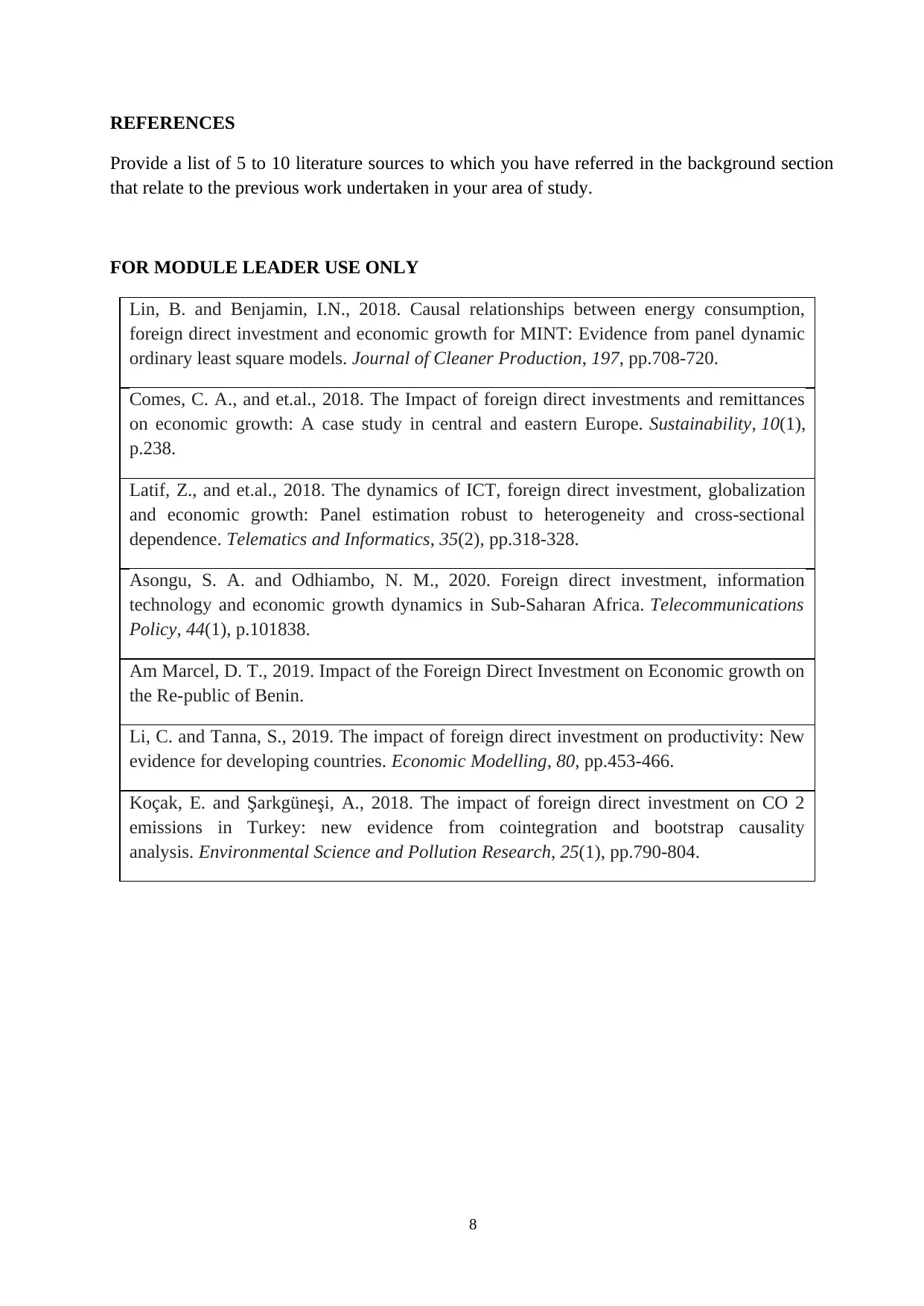
REFERENCES
Provide a list of 5 to 10 literature sources to which you have referred in the background section
that relate to the previous work undertaken in your area of study.
FOR MODULE LEADER USE ONLY
Lin, B. and Benjamin, I.N., 2018. Causal relationships between energy consumption,
foreign direct investment and economic growth for MINT: Evidence from panel dynamic
ordinary least square models. Journal of Cleaner Production, 197, pp.708-720.
Comes, C. A., and et.al., 2018. The Impact of foreign direct investments and remittances
on economic growth: A case study in central and eastern Europe. Sustainability, 10(1),
p.238.
Latif, Z., and et.al., 2018. The dynamics of ICT, foreign direct investment, globalization
and economic growth: Panel estimation robust to heterogeneity and cross-sectional
dependence. Telematics and Informatics, 35(2), pp.318-328.
Asongu, S. A. and Odhiambo, N. M., 2020. Foreign direct investment, information
technology and economic growth dynamics in Sub-Saharan Africa. Telecommunications
Policy, 44(1), p.101838.
Am Marcel, D. T., 2019. Impact of the Foreign Direct Investment on Economic growth on
the Re-public of Benin.
Li, C. and Tanna, S., 2019. The impact of foreign direct investment on productivity: New
evidence for developing countries. Economic Modelling, 80, pp.453-466.
Koçak, E. and Şarkgüneşi, A., 2018. The impact of foreign direct investment on CO 2
emissions in Turkey: new evidence from cointegration and bootstrap causality
analysis. Environmental Science and Pollution Research, 25(1), pp.790-804.
8
Provide a list of 5 to 10 literature sources to which you have referred in the background section
that relate to the previous work undertaken in your area of study.
FOR MODULE LEADER USE ONLY
Lin, B. and Benjamin, I.N., 2018. Causal relationships between energy consumption,
foreign direct investment and economic growth for MINT: Evidence from panel dynamic
ordinary least square models. Journal of Cleaner Production, 197, pp.708-720.
Comes, C. A., and et.al., 2018. The Impact of foreign direct investments and remittances
on economic growth: A case study in central and eastern Europe. Sustainability, 10(1),
p.238.
Latif, Z., and et.al., 2018. The dynamics of ICT, foreign direct investment, globalization
and economic growth: Panel estimation robust to heterogeneity and cross-sectional
dependence. Telematics and Informatics, 35(2), pp.318-328.
Asongu, S. A. and Odhiambo, N. M., 2020. Foreign direct investment, information
technology and economic growth dynamics in Sub-Saharan Africa. Telecommunications
Policy, 44(1), p.101838.
Am Marcel, D. T., 2019. Impact of the Foreign Direct Investment on Economic growth on
the Re-public of Benin.
Li, C. and Tanna, S., 2019. The impact of foreign direct investment on productivity: New
evidence for developing countries. Economic Modelling, 80, pp.453-466.
Koçak, E. and Şarkgüneşi, A., 2018. The impact of foreign direct investment on CO 2
emissions in Turkey: new evidence from cointegration and bootstrap causality
analysis. Environmental Science and Pollution Research, 25(1), pp.790-804.
8
1 out of 8
Related Documents
Your All-in-One AI-Powered Toolkit for Academic Success.
+13062052269
info@desklib.com
Available 24*7 on WhatsApp / Email
![[object Object]](/_next/static/media/star-bottom.7253800d.svg)
Unlock your academic potential
Copyright © 2020–2026 A2Z Services. All Rights Reserved. Developed and managed by ZUCOL.





